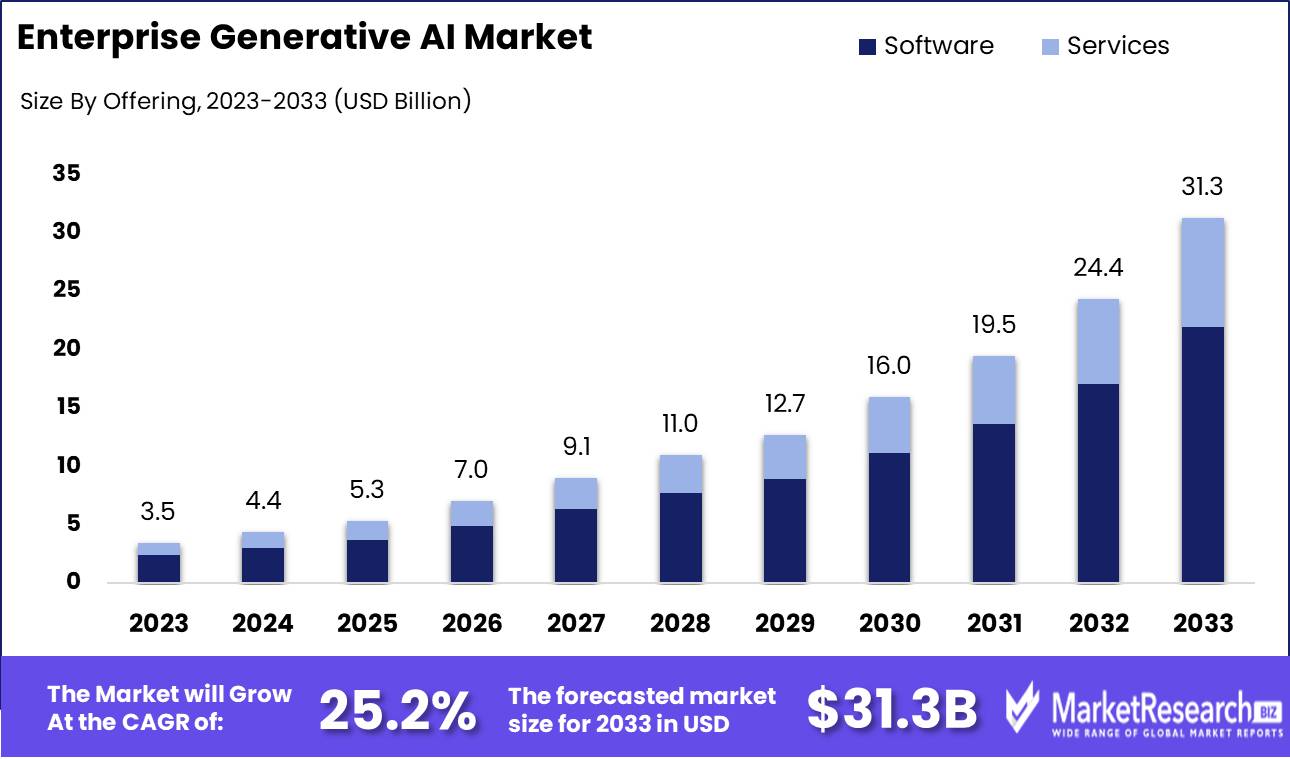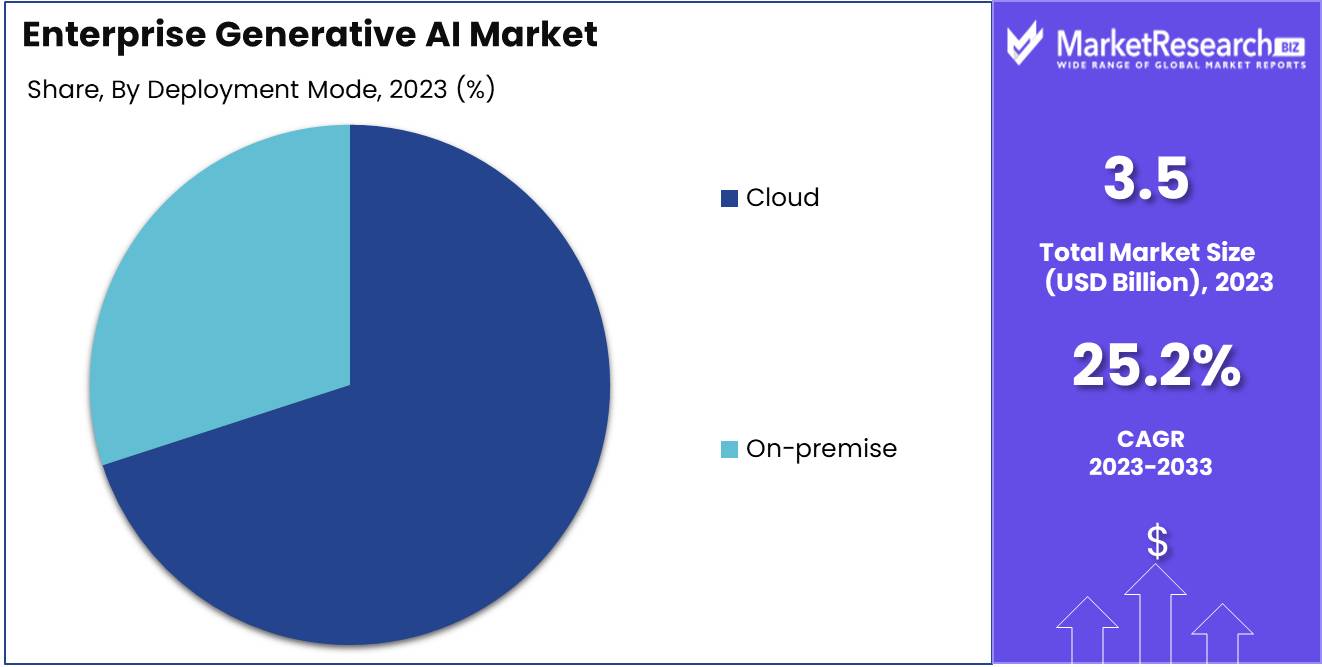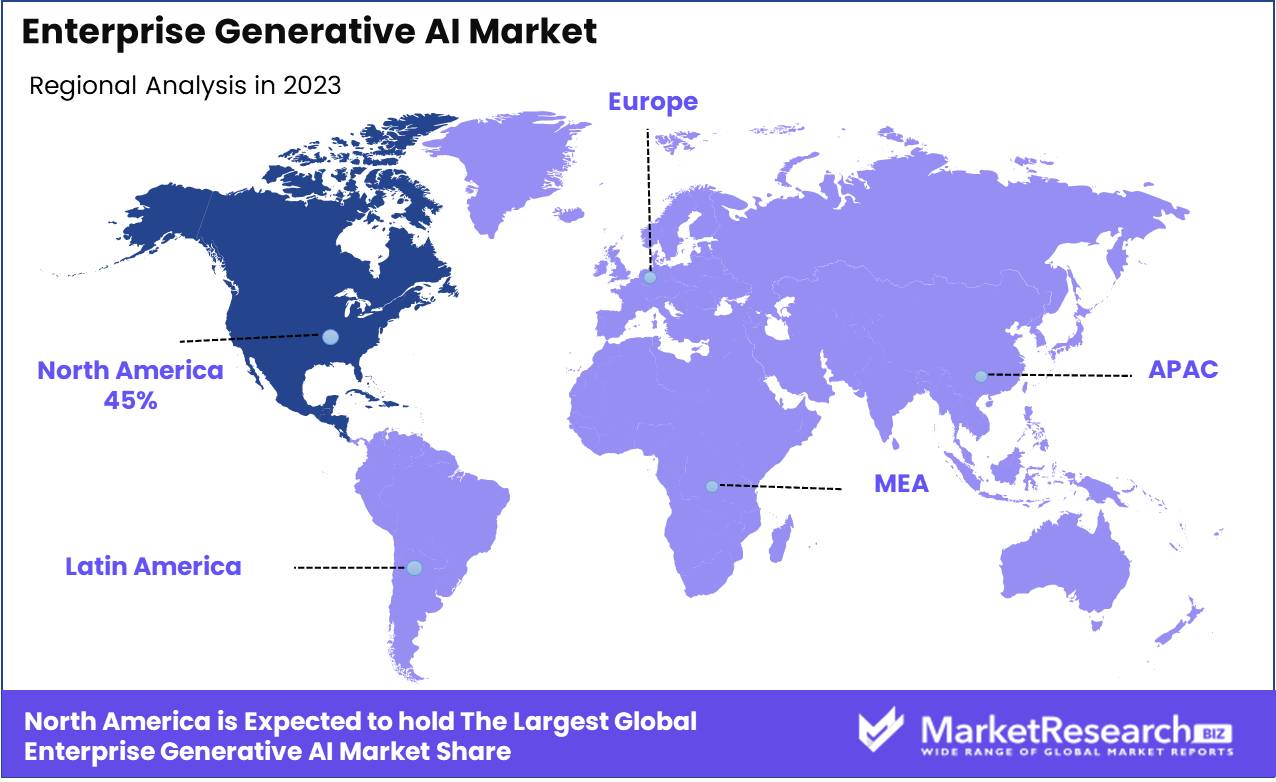
Enterprise Generative AI Market By Industry Vertical (IT & Telecom, BFSI (Banking, Financial Services, and Insurance), Healthcare, Media & Entertainment, Retail, Automotive, Manufacturing), By Application (Content Creation, Customer Service, Marketing, Product Development, R&D, Fraud Detection), By Offering (Software, Services), By Deployment Mode (Cloud, On-premise), By Region and Companies - Industry Segment Outlook, Market Assessment, Competition Scenario, Trends and Forecast 2024-2033
-
50279
-
Aug 2024
-
304
-
-
This report was compiled by Vishwa Gaul Vishwa is an experienced market research and consulting professional with over 8 years of expertise in the ICT industry, contributing to over 700 reports across telecommunications, software, hardware, and digital solutions. Correspondence Team Lead- ICT Linkedin | Detailed Market research Methodology Our methodology involves a mix of primary research, including interviews with leading mental health experts, and secondary research from reputable medical journals and databases. View Detailed Methodology Page
-
Quick Navigation
Report Overview
The Global Enterprise Generative AI Market was valued at USD 3.5 Bn in 2023. It is expected to reach USD 31.3 Bn by 2033, with a CAGR of 25.2% during the forecast period from 2024 to 2033.
The Enterprise Generative AI Market represents a rapidly evolving sector where advanced AI algorithms are utilized to autonomously generate content, data, and solutions tailored to enterprise needs. This market is characterized by the integration of generative AI technologies across various industries, including finance, healthcare, and manufacturing, to enhance operational efficiency, drive innovation, and personalize customer experiences. As businesses increasingly prioritize automation and data-driven decision-making, the adoption of generative AI is becoming pivotal in maintaining competitive advantage, reducing costs, and enabling scalable, innovative solutions that meet the dynamic demands of the modern enterprise landscape.

The Enterprise Generative AI Market is poised for significant growth as organizations across sectors increasingly recognize the value of AI-driven innovation. The integration of generative AI into enterprise operations is not just a market trends but a fundamental shift toward more intelligent and autonomous systems that can drive substantial business outcomes. Companies like JPMorgan Chase are already harnessing the power of generative AI to offer personalized financial advisory services, resulting in a 12% increase in customer engagement and a 15% revenue growth within the first year. This exemplifies how generative AI can transform traditional business models, offering tailored solutions that enhance customer satisfaction and drive financial performance.
The enterprise application of generative AI is not limited to financial services. Microsoft’s integration of generative AI into its cloud services led to a $3 billion increase in annual revenue, with a concurrent 15% improvement in customer satisfaction metrics. This case highlights the broad applicability and tangible benefits of generative AI in enhancing customer experiences and boosting operational efficiency. As more enterprises follow suit, the market is expected to witness accelerated adoption, driven by the need for innovation and the pursuit of competitive differentiation.
In the near term, enterprises that leverage generative AI will likely gain a competitive edge, as they can offer more personalized, efficient, and scalable solutions. The Enterprise Generative AI Market is, therefore, not just expanding in terms of size but also in terms of its impact on business strategy and performance. As AI continues to evolve, its role in shaping the future of enterprise operations will be profound, making it a critical area of focus for forward-thinking organizations.
Key Takeaways
- Market Value: The Global Enterprise Generative AI Market was valued at USD 3.5 Bn in 2023. It is expected to reach USD 31.3 Bn by 2033, with a CAGR of 25.2% during the forecast period from 2024 to 2033.
- By Application: Content Creation constitutes 35% of the market, enhancing productivity in generating marketing and communication materials.
- By Industry Vertical: IT & Telecom represents 30%, leveraging AI for advanced content generation and customer engagement.
- By Offering: Software dominates with 70%, providing the core tools for generative AI applications.
- By Deployment Mode: Cloud solutions lead with 70%, offering scalability and real-time collaboration.
- Regional Dominance: North America holds a 45% market share, driven by technological innovation and strong enterprise adoption.
- Growth Opportunity: Expanding AI-driven content creation tools into industries like healthcare and finance can open new markets and drive significant growth.
Driving factors
Growing Need for Automation in Business Processes
The growing need for automation in business processes is a primary driver of the Enterprise Generative AI Market. As enterprises strive to enhance efficiency, reduce operational costs, and streamline workflows, the adoption of AI-driven automation solutions is becoming increasingly crucial. Generative AI, with its ability to automate complex tasks such as content creation, data analysis, and customer service interactions, offers significant advantages for businesses looking to optimize their operations.
By automating these processes, companies can free up human resources for more strategic initiatives, ultimately leading to increased productivity and cost savings. This growing reliance on automation is driving the demand for generative AI solutions across various industries, propelling market growth.
Advancements in AI and Machine Learning Algorithms
Advancements in AI and machine learning development algorithms are another critical factor contributing to the growth of the Enterprise Generative AI Market. The continuous improvement of artificial intelligence models, particularly in areas such as natural language models processing, image generation, and predictive analytics, has significantly enhanced the capabilities of generative AI. These advancements enable more accurate, efficient, and scalable solutions that can be tailored to specific business needs.
As AI and machine learning technologies evolve, generative AI is becoming more sophisticated, allowing enterprises to leverage these tools for a wide range of applications. This technological progress is driving the adoption of generative AI solutions, further expanding the market.
Increasing Demand for Personalized and Scalable Solutions
The increasing demand for personalized and scalable solutions is a key driver of the Enterprise Generative AI Market. Enterprises are seeking AI tools that can be tailored to their unique needs and scaled according to their operational requirements. Generative AI offers the flexibility to create customized content, generate personalized customer interactions, and adapt to varying levels of demand.
This ability to provide personalized and scalable solutions makes generative AI particularly attractive to businesses looking to enhance customer engagement, improve decision-making, and achieve operational efficiency. The growing emphasis on customization and scalability is thus driving the widespread adoption of generative AI in the enterprise sector.
Restraining Factors
High Implementation and Training Costs
High implementation and training costs are significant retraining factors for the Enterprise Generative AI Market. Deploying generative artificial intelligence solutions within an enterprise requires substantial investment in infrastructure, software, and skilled personnel. The costs associated with integrating AI into existing systems, customizing solutions to meet specific business needs, and training employees to effectively use these technologies can be prohibitive, especially for small and medium-sized enterprises (SMEs).
These financial barriers can slow the adoption rate of generative AI solutions, as companies may hesitate to commit to such high upfront costs without clear, immediate returns on investment. As a result, market growth may be concentrated among larger enterprises with the resources to absorb these costs, potentially limiting broader market expansion.
Concerns Over Data Privacy and AI Ethics
Concerns over data privacy and AI ethics also pose significant challenges to the growth of the Enterprise Generative AI Market. Generative AI systems often require access to vast amounts of data to function effectively, raising issues related to data security and the potential misuse of sensitive information. Enterprises must navigate complex regulations around data protection, such as GDPR in Europe, and address the ethical implications of using artificial intelligence, including bias, transparency, and accountability.
These concerns can create hesitation among businesses and consumers alike, leading to slower adoption of AI technologies. Ethical controversies or data breaches can severely damage a company's reputation, making it imperative for enterprises to implement robust data governance and ethical frameworks to mitigate these risks. Addressing these concerns is critical for building trust and ensuring the sustainable growth of the generative AI market.
By Industry Vertical Analysis
IT & Telecom held a dominant market position in the By Industry Vertical segment of the Enterprise Generative AI Market, capturing more than a 30% share.
In 2023, IT & Telecom led the Enterprise Generative AI Market in 2023, accounting for over 30% of the industry vertical market share. The sector's early adoption of cutting-edge technologies and its focus on digital transformation have driven significant investments in generative AI to optimize operations, enhance customer engagement, and innovate service offerings.
Other key industries such as BFSI (Banking, Financial Services, and Insurance), Healthcare, and Media & Entertainment are also increasingly integrating generative AI to streamline processes, reduce costs, and create new revenue streams. The Retail, Automotive, and Manufacturing sectors are further exploring generative AI to improve supply chain management, product design, and customer personalization.
By Application Analysis
Content Creation held a dominant market position in the By Application segment of the Enterprise Generative AI Market, capturing more than a 35% share.
In 2023, Content Creation emerged as the leading application in the Enterprise Generative AI Market, securing over 35% of the market share. This significant share reflects the increasing adoption of generative AI tools to automate and enhance content production across various industries. Enterprises are leveraging AI for generating high-quality content, such as text, images, and videos, which has become critical for maintaining competitive advantage in digital marketing, social media, and brand communication.
Generative AI is being applied in Customer Service for automating responses and creating personalized interactions, as well as in Marketing for generating targeted campaigns. Other applications like Product Development, R&D, and Fraud Detection are also gaining traction, demonstrating the versatile potential of generative AI across enterprise functions.
By Offering Analysis
Software held a dominant market position in the By Offering segment of the Enterprise Generative AI Market, capturing more than a 70% share.
In 2023, Software offerings dominated the Enterprise Generative AI Market in 2023, capturing over 70% of the market share. This dominance is driven by the widespread deployment of AI-powered software solutions across various enterprise functions, including content creation, customer service, and marketing automation. Enterprises are increasingly investing in AI software to streamline operations and gain a competitive edge through advanced data analytics and decision-making capabilities.
While Services such as consulting, implementation, and support also play a crucial role in enabling successful AI adoption, the primary focus remains on developing and deploying robust AI software platforms.
By Deployment Mode Analysis
Cloud held a dominant market position in the By Deployment Mode segment of the Enterprise Generative AI Market, capturing more than a 70% share.
In 2023, Cloud deployment models led the Enterprise Generative AI Market in 2023, with a substantial 70% market share. The scalability, flexibility, and cost-effectiveness of cloud-based solutions make them the preferred choice for enterprises looking to integrate generative AI into their operations. Cloud platforms provide the necessary infrastructure to support complex AI models, enabling real-time data processing and facilitating seamless collaboration across global teams.
Although On-premise solutions remain relevant for organizations with strict data security and compliance requirements, the rapid adoption of cloud-based generative AI solutions highlights the growing market trends towards digital transformation and cloud computing in the enterprise sector.

Key Market Segments
By Industry Vertical
- IT & Telecom
- BFSI (Banking, Financial Services, and Insurance)
- Healthcare
- Media & Entertainment
- Retail
- Automotive
- Manufacturing
By Application
- Content Creation
- Customer Service
- Marketing
- Product Development
- R&D
- Fraud Detection
By Offering
- Software
- Services
By Deployment Mode
- Cloud
- On-premise
Growth Opportunity
Industry-Specific Applications
The development of industry-specific generative AI applications represents a significant growth opportunity for the Enterprise Generative AI Market in 2024. By tailoring AI solutions to the unique needs of various industries, such as healthcare, finance, retail, and manufacturing, enterprises can achieve more precise and impactful outcomes.
Generative AI can be used to automate medical report generation in healthcare, create personalized financial strategies in banking, or optimize supply chain logistics in manufacturing. These industry-specific applications not only address targeted pain points but also enhance the relevance and effectiveness of generative AI, driving adoption and market expansion.
Tapping into High-Demand Sectors
The expansion of generative AI in content creation and marketing offers another robust growth opportunity in 2024. As businesses increasingly rely on digital channels to engage with customers, the demand for high-quality, scalable content has surged. Generative AI can automate the creation of blog posts, social media content, personalized marketing emails, and even video scripts, significantly reducing the time and resources required for content production.
This capability is particularly valuable in marketing, where timely and relevant content is crucial for capturing consumer attention. By offering AI-driven solutions for content creation, enterprises can enhance their digital marketing efforts, leading to greater customer engagement and competitive advantage.
Latest Trends
Revolutionizing Enterprise Communications
The use of generative AI for dynamic content generation is a key market trends that will shape the Enterprise Generative AI Market in 2024. This technology enables enterprises to create personalized, contextually relevant content on the fly, whether for customer interactions, marketing campaigns, or internal communications. Dynamic content generation allows businesses to tailor messages to specific audiences, improving engagement and effectiveness.
AI can generate personalized product recommendations, customized marketing materials, or real-time customer support responses. As enterprises seek to enhance communication strategies and improve customer experiences, the demand for dynamic content generation tools is expected to rise, driving further adoption of generative AI.
Integration with Existing Enterprise Software
The integration of generative AI with existing enterprise software is another significant trend for 2024. As businesses increasingly rely on AI-driven tools, the ability to seamlessly integrate these solutions with existing platforms such as CRM systems, project management tools, and data analytics software becomes crucial. This integration enables enterprises to leverage generative AI's capabilities without disrupting established workflows, enhancing productivity and efficiency.
Integrating AI-generated content directly into marketing automation platforms or incorporating AI-driven insights into decision-making tools can streamline operations and improve outcomes. As integration capabilities continue to improve, they are expected to drive greater adoption of generative AI across various enterprise functions.
Regional Analysis
North America led the Enterprise Generative AI Market in 2023, capturing a dominant 45% share, driven by advanced AI adoption and significant investment in AI technologies.
In 2023, North America emerged as the leading region in the Enterprise Generative AI Market, holding a substantial 45% share. This leadership is fueled by the region’s advanced technological infrastructure, high investment in AI research, and the presence of major technology companies driving innovation in enterprise applications. The U.S., in particular, plays a crucial role in the market, with enterprises increasingly adopting generative AI to enhance productivity, automate processes, and create innovative solutions across various industries.
Europe follows as a significant business leaders, with growing investments in AI across sectors like finance, manufacturing, and healthcare. The Asia Pacific region is experiencing rapid growth, particularly in countries like China, Japan, and South Korea, where AI adoption is accelerating in response to digital transformation initiatives. Latin America and the Middle East & Africa are also witnessing gradual adoption, with increasing awareness of the benefits of generative AI in optimizing business operations and fostering innovation.

Key Regions and Countries
North America
- US
- Canada
- Mexico
Western Europe
- Germany
- France
- The UK
- Spain
- Italy
- Portugal
- Ireland
- Austria
- Switzerland
- Benelux
- Nordic
- Rest of Western Europe
Eastern Europe
- Russia
- Poland
- The Czech Republic
- Greece
- Rest of Eastern Europe
APAC
- China
- Japan
- South Korea
- India
- Australia & New Zealand
- Indonesia
- Malaysia
- Philippines
- Singapore
- Thailand
- Vietnam
- Rest of APAC
Latin America
- Brazil
- Colombia
- Chile
- Argentina
- Costa Rica
- Rest of Latin America
Middle East & Africa
- Algeria
- Egypt
- Israel
- Kuwait
- Nigeria
- Saudi Arabia
- South Africa
- Turkey
- United Arab Emirates
- Rest of MEA
Key Players Analysis
In 2024, the Enterprise Generative AI Market is led by industry heavyweights and innovative challengers, all of whom are pushing the boundaries of AI applications in the enterprise sector. OpenAI remains a pivotal force with its GPT-4 model, driving advancements in natural language models generation and powering various enterprise applications.
Google DeepMind and IBM Watson continue to be major players, leveraging their deep research capabilities to integrate generative AI into a broad range of business solutions, from customer service automation to advanced analytics.
Microsoft Azure AI and Salesforce Einstein are making significant strides in embedding generative AI within cloud and CRM platforms, respectively, providing enterprises with scalable and intelligent tools to enhance decision-making and customer engagement. Adobe Sensei is leading in the creative space, offering generative AI tools that revolutionize content creation, from image editing to marketing material generation.
NVIDIA, with its stronghold in AI hardware, is expanding its influence through AI software solutions that cater to enterprise needs, particularly in areas requiring high computational power like generative design and simulation. Hugging Face and Cohere are emerging as critical business leaders, offering open-source and customizable AI models that enable enterprises to tailor generative AI to specific needs.
Anthropic, C3.ai, and H2O.ai are also noteworthy for their contributions to enterprise AI, focusing on ethical AI, enterprise AI applications, and AI-driven insights. Snorkel AI, Element AI (ServiceNow), and Scale AI are rapidly gaining recognition for their specialized AI solutions that simplify data labeling, automation, and decision-making processes. Collectively, these companies are driving the widespread adoption of generative AI in enterprises, making AI-driven innovation more accessible and impactful across industries.
Market Key Players
- OpenAI
- Google DeepMind
- IBM Watson
- Microsoft Azure AI
- Salesforce Einstein
- Adobe Sensei
- NVIDIA
- Hugging Face
- Cohere
- Anthropic
- C3.ai
- H2O.ai
- Snorkel AI
- Element AI (ServiceNow)
- Scale AI
Recent Development
- In April 2024, Microsoft Azure AI launched a new generative AI toolkit designed specifically for enterprise-level content creation. This toolkit is expected to boost productivity by 35%.
- In February 2024, OpenAI partnered with a leading enterprise software company to integrate GPT-4 into business applications. This integration aims to enhance automation and decision-making processes by 30%.
Report Scope
Report Features Description Market Value (2023) USD 3.5 Bn Forecast Revenue (2033) USD 31.3 Bn CAGR (2024-2033) 25.2% Base Year for Estimation 2023 Historic Period 2018-2023 Forecast Period 2024-2033 Report Coverage Revenue Forecast, Market Dynamics, Competitive Landscape, Recent Developments Segments Covered By Industry Vertical (IT & Telecom, BFSI (Banking, Financial Services, and Insurance), Healthcare, Media & Entertainment, Retail, Automotive, Manufacturing), By Application (Content Creation, Customer Service, Marketing, Product Development, R&D, Fraud Detection), By Offering (Software, Services), By Deployment Mode (Cloud, On-premise) Regional Analysis North America - The US, Canada, & Mexico; Western Europe - Germany, France, The UK, Spain, Italy, Portugal, Ireland, Austria, Switzerland, Benelux, Nordic, & Rest of Western Europe; Eastern Europe - Russia, Poland, The Czech Republic, Greece, & Rest of Eastern Europe; APAC - China, Japan, South Korea, India, Australia & New Zealand, Indonesia, Malaysia, Philippines, Singapore, Thailand, Vietnam, & Rest of APAC; Latin America - Brazil, Colombia, Chile, Argentina, Costa Rica, & Rest of Latin America; Middle East & Africa - Algeria, Egypt, Israel, Kuwait, Nigeria, Saudi Arabia, South Africa, Turkey, United Arab Emirates, & Rest of MEA Competitive Landscape OpenAI, Google DeepMind, IBM Watson, Microsoft Azure AI, Salesforce Einstein, Adobe Sensei, NVIDIA, Hugging Face, Cohere, Anthropic, C3.ai, H2O.ai, Snorkel AI, Element AI (ServiceNow), Scale AI Customization Scope Customization for segments, region/country-level will be provided. Moreover, additional customization can be done based on the requirements. Purchase Options We have three licenses to opt for: Single User License, Multi-User License (Up to 5 Users), Corporate Use License (Unlimited User and Printable PDF) -
-
- OpenAI
- Google DeepMind
- IBM Watson
- Microsoft Azure AI
- Salesforce Einstein
- Adobe Sensei
- NVIDIA
- Hugging Face
- Cohere
- Anthropic
- C3.ai
- H2O.ai
- Snorkel AI
- Element AI (ServiceNow)
- Scale AI




